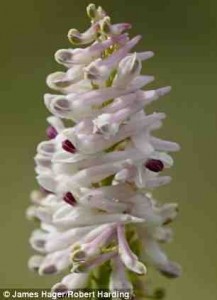Corydalis plant roots contain the painkiller dehydrocorybulbine
This is not thought to lose effectiveness over time, as opiate drugs do
In traditional Chinese medicine, the plants are used to treat headaches
They are thought to be most effective at treating persistent, low-level pain
An ancient Chinese herbal remedy could be used to fight chronic pain, new research has revealed.
The roots of the flowering plant Corydalis – a member of the poppy family – have been used for centuries as a pain reliever.
The roots of Corydalis plants contain a substance that acts as a painkiller which is particularly effective for treating chronic, low-level pain.
Image shows the flower of a Corydalis caseana plant
Now scientists have found they contain a key pain-relieving ingredient known as dehydrocorybulbine (DHCB) and that they do not lose effectiveness over time like traditional opiate drugs.
The chemical acts not through the morphine receptor but through other receptors, in particular one that binds dopamine.
Dopamine is a neurotransmitter that helps control the brain’s reward and pleasure centres and also helps regulate movement and emotional responses.
Olivier Civelli of the University of California, Irvine, said: ‘Our study reports the discovery of a new natural product that can relieve pain.
‘This analgesic acts in animal assays against the three types of pain that afflict humans, including acute, inflammatory, and neuropathic or chronic pain.’
He made the discovery as part of the ‘herbalome’ project, an effort to catalogue all of the chemical components of traditional Chinese medicine.
The Corydalis plants that were the focus of the new study grow mainly in central eastern China, where underground tubers are harvested, ground, and boiled in hot vinegar.
Those concoctions are often prescribed to treat pain, including headaches and back pain.
The researchers went looking for compounds in Corydalis that appeared likely to act in a manner similar to morphine.
Dr Civelli said: ‘We landed on DHCB but rapidly found that it acts not through the morphine receptor but through other receptors, in particular one that binds dopamine.’
The discovery adds to earlier evidence showing that the dopamine D2 receptor plays a role in pain sensation.
The plant roots have been used in traditional Chinese herbal medicine for hundreds of years – they are often used to treat headaches and back pain. Image shows farmers harvesting the roots in eastern China
While Corydalis extracts, or isolated DHCB, work against all types of pain, they hold special promise for those who suffer with persistent, low-level chronic pain.
For one thing, DHCB doesn’t appear to lose effectiveness with time in the way that traditional opiate drugs do.
Dr Civelli said: ‘We have good pain medications for acute pain – codeine or morphine, for example.
‘We have pain medication for inflammatory pain, such as aspirin or acetaminophen.
‘We do not have good medications for chronic pain. DHCB may not be able to relieve strong chronic pain, but may be used for low-level chronic pain.’
He warned further testing for toxicity is needed before doctors should consider prescribing it to patients.
The study was published in the journal Current Biology.
Source: Daily Mail

